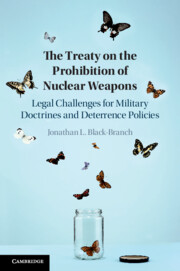 The Treaty on the Prohibition of Nuclear Weapons
The Treaty on the Prohibition of Nuclear Weapons Published online by Cambridge University Press: 17 April 2021
Advocates of the Treaty on the Prohibition of Nuclear Weapons (TPNW) invariably view nuclear weapons as a threat to international peace and security. The ideals presented by the humanitarian disarmament movement challenge conventional nuclear deterrence policies and defense doctrines currently held by the nuclear-weapon states and their allies. An aim of the TPNW is to challenge basic deterrence assumptions with the intention of advancing normative change by delegitimizing nuclear weapons and changing how they are perceived throughout the world. The position of some states that nuclear weapons provide a military deterrence for overall global security and protection against war is under increasing scrutiny and now there is an actual treaty – the TPNW – opposing this position.
To save this book to your Kindle, first ensure no-reply@cambridge.org is added to your Approved Personal Document E-mail List under your Personal Document Settings on the Manage Your Content and Devices page of your Amazon account. Then enter the ‘name’ part of your Kindle email address below. Find out more about saving to your Kindle.
Note you can select to save to either the @free.kindle.com or @kindle.com variations. ‘@free.kindle.com’ emails are free but can only be saved to your device when it is connected to wi-fi. ‘@kindle.com’ emails can be delivered even when you are not connected to wi-fi, but note that service fees apply.
Find out more about the Kindle Personal Document Service.
To save content items to your account, please confirm that you agree to abide by our usage policies. If this is the first time you use this feature, you will be asked to authorise Cambridge Core to connect with your account. Find out more about saving content to Dropbox.
To save content items to your account, please confirm that you agree to abide by our usage policies. If this is the first time you use this feature, you will be asked to authorise Cambridge Core to connect with your account. Find out more about saving content to Google Drive.